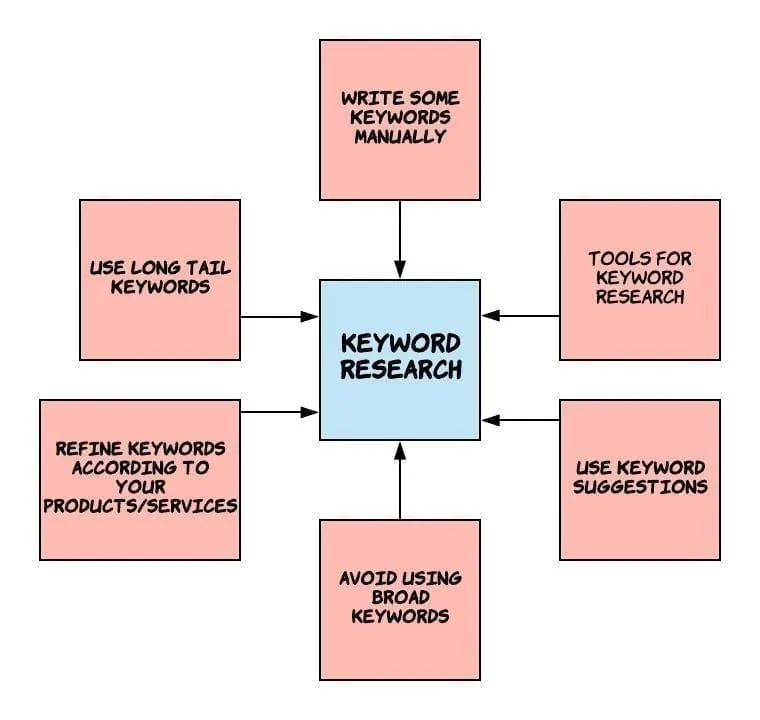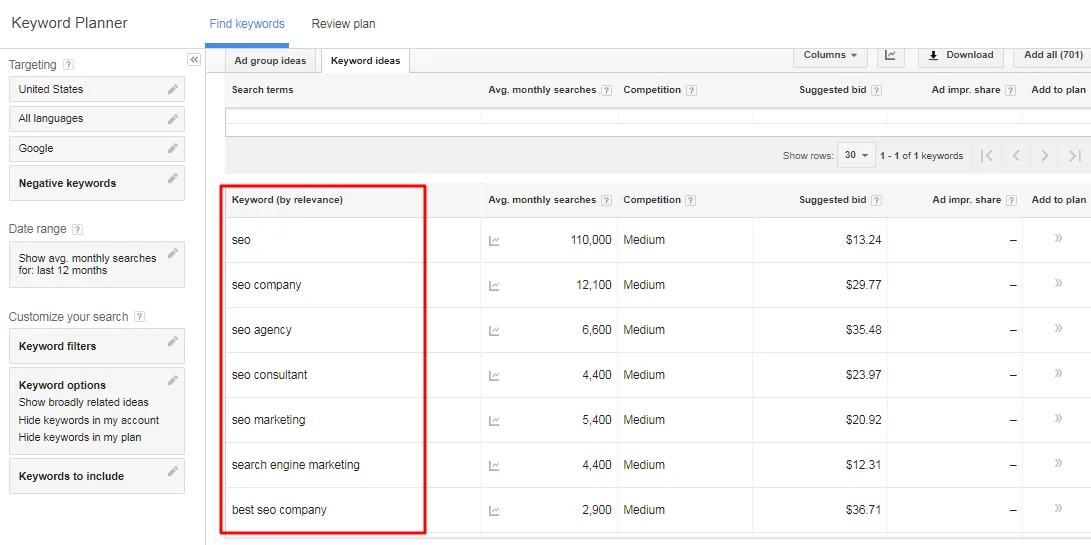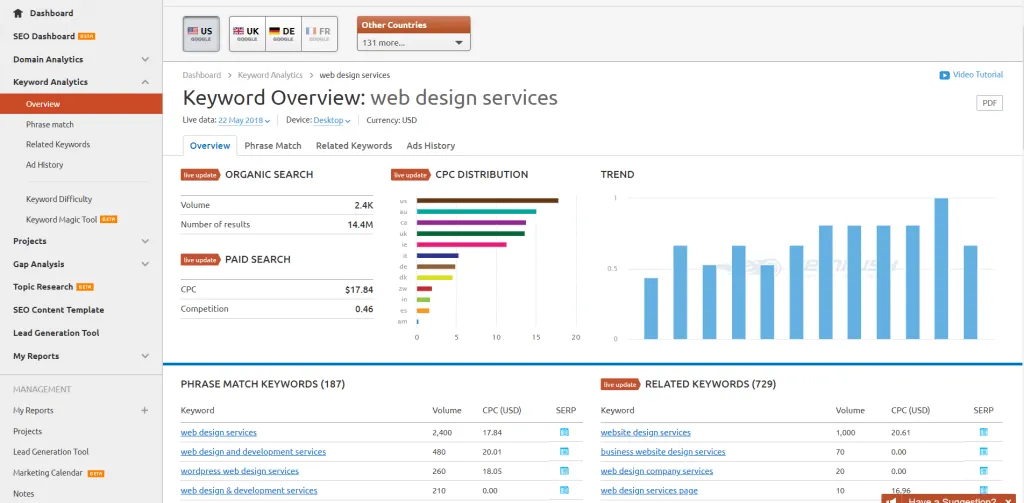
Day 6 : Keyword Research
In the previous challenge, we wrote about what competitor research is and how it plays a significant role to increase our website ranking. There we read about keyword research, and that is also our next day challenge.
Before we jump into Keyword Research in detail, let us first understand what keywords means. Keywords simply gives an idea of what your content offers in detail. Since the article is related to SEO, let us talk in the related terms. Keywords are the words entered by a user when putting a search query in Google. A website owner or content writer knows the importance of keywords and placing them at appropriate places.
What is the importance of keywords and keywords research?
Keywords act as a bridge between the search query put up by the user and the content on web pages that serve that purpose. Better the content on your webpage, more are your chances of being in the top ten search results of any query. Your content should be written with the keyword in mind. Choose your keywords wisely.
Long Tail Keywords
As the name suggests, long tail keywords are long and lengthy. When the user is not really sure about what he is searching for or he has a problem in mind, he enters long sentences in the search. When you create content for your website, try to consider these keywords as well so that you may drive more traffic towards your website. For example, you go to a restaurant and a song is playing there and you like it. You come back home and want to download the song but are not sure about the name of the singer of the album. So you try searching with 1 or two lines from the song i.e. your search query is long. Those keywords are considered to be your long tail keywords.

Now that you are aware of what keywords are, let us see how to do keyword research. There are some basic steps or rather tips you need to follow to get the best keywords related to your website. Let us see them one by one:
- Manually write down some keywords:
Think from the point of view of your targeted user. Write down a list of keywords that you think perfectly relate to the product or service you offer. You can also keep in mind the queries starting from how, what, where etc that the users might put up related to your services and products. A keyword research tool may also serve the purpose, but the keywords you write don manually will be more real-time and original.
- Tools for Keyword Research:
There are many keywords research tools available that are both paid and unpaid. The unpaid tools give you just a handful of keywords for free and then you eventually have to sign up for their services to get more. Let us see some of the widely used keyword research tools-
- Google AdWords – Google AdWords uses a tool called Google Keyword Planner. Using this tool you can not just generate keywords for your website but also know what keywords are your competitors targeting. You just have to enter the site URL and you instantly get the list of keywords.

Google AdWords basically uses 3 types of keywords.
Broad Match Keywords: As the name suggests, these keywords are long and broad. Many times when the user is not sure about what exactly he is searching for, he enters a broad descriptive query. This in return, includes all the search results that may be similar or even close to the search query made by him. This is the most common type of keyword used by the user to search for something on Google. When a user searches for such query, Google also includes the results that are somewhat similar to the query made. This increases the chances of your webpage being among the top search results.
Exact match Keywords: These keywords are related to the exact query the user inputs. You have to determine your keywords in a way that it matches exactly with the search query of the user so that your webpage ends up among the top search results. This is the most difficult type of keyword to analyze as you do not know what exactly will the user write in the search. You have to be very precise while choosing your keywords so that it matches exactly with the content on your webpage.
Phrase Match Keywords: It is a combination of both broad match and exact match keywords. These keywords show up when a search query matches a part of your keyword. Search results include the close variation of search as well. For example, the user searches for “cars”, the search results will also include the webpages for “buy a car”, “car reviews”, etc.
It is important to analyze that how are your competitors using these keywords to rank better so that you may adopt a better strategy than them. Keywords should be relevant to your webpage and the content on it.
- Google Analytics – This tool tells you exactly what the users are searching for so that you can serve them accordingly. It even allows you to check how many times a word was searched for someone so that you know what to target first.
- Google Trends – It is a free Google product. Most of the tools show you past keywords that have been searched for the maximum times. But Google Trends shows you the latest trending keywords. It helps in keeping you updated about the needs of users and what they look for on Google.
- SEMrush (paid tool)– This tool helps in generating profitable keywords for your website. You can also know what keywords are you competitors paying for and what ads are they using for these keywords. This gives you an idea of what keywords should you focus more on.

Example of Keyword Research on Semrush - Moz Keyword Explorer (paid tool) – You just have to enter the keyword and you instantly get the details about the volume and competition of that keyword. This is a paid tool. This tool also considers the related keywords for similar searches.
3. Use keyword suggestions: Once you have created a list of your keywords, you can refine it even further by using the keyword suggestion tool on the keyword research tools. It gives you a better idea of how can a user rearrange any keyword or add or remove words from it while initiating a search. This way, you get more close to user requirements.
4. Avoid using Broad Keywords:
If your business focuses mainly on local users or is restricted to certain area or region, avoid using broad keywords. Using broad keyword can get you a lot of unnecessary competition. You might have to fight for a ranking with a business that serves a completely different region but uses the same keyword as yours. To avoid this, use the region name you serve along with the keyword. For Example: if you offer cars for rent in New York, instead of using “cars for rent” as a keyword use “cars for rent New York”. this will drive huge traffic from your local areas.
- Refine Keywords according to your products/services:
Focus more on the products or services you offer while your keyword research. This will help in targeting the exact user looking for it. Including product name ensures that your website will show up when a user searches for that product. This may be a hectic task if you offer a wide range of products but helps in driving in huge traffic.
- Use Long Tail keywords:
As explained above, when the user is now sure what exactly is he searching for, he enters long sentences as a search query. That’s when the long tail keywords come into play. If you include long tail keywords,
 there might be chances that your webpage may show up in a long search query related to your products or services.
there might be chances that your webpage may show up in a long search query related to your products or services.
Keep these important steps or tips in mind while doing your keyword research and see your website growing in performance and user traffic as well. Proper keyword research helps in creating an SEO Friendly content that makes you and better automatically. It is an unending process. The more you go deep into this, the more potential keywords you will get every day. Yes it does takes up a lot of time, but the result is always fruitful.
When we talk about keyword research, we often do not consider mobile keyword research. Majority of the population uses internet on phone. It is the most convenient way to search something on the go. People usually search for some product or service and write “near me” or “nearby” along with it. Location keywords are mostly searched from mobile. Thus it is important to add mobile and location friendly keywords to increase your website view.
Now once you have your keywords list ready, decide your page title accordingly. This is the first thing user notices about your page so you can not compromise with this. This section will be covered in the upcoming day challenge.

